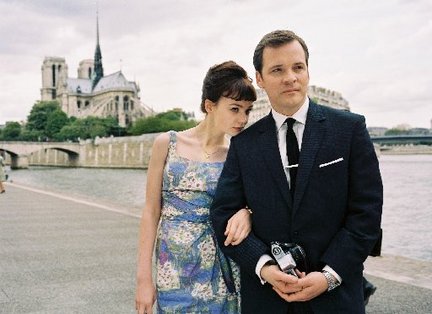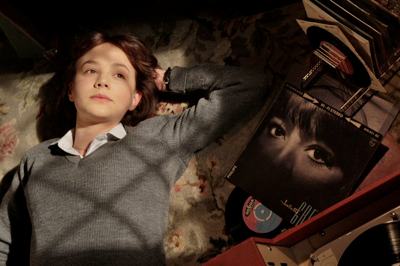 TV
TV In Which Introducing Joey Lauren Adams Into Any Situation Achieves A Good Result
 Tuesday, March 30, 2010 at 8:38AM
Tuesday, March 30, 2010 at 8:38AM Ed. Note: We're in our PLEDGE DRIVE, where we ask you to donate if you like the site. We will try to keep the virtual spanging to a minimum, but any donations are much appreciated and would go a long way towards keeping This Recording on the cyber airwaves. In conclusion, we need your help.

The World According
to Tara
by ELEANOR MORROW
When I realized that Diablo Cody and John Irving were in fact the same person, I was not totally surprised.

Irving's 1981 epic The Hotel New Hampshire is probably his worst novel. The family dog is named Sorrow, two major characters die for no reason in an airplane crash, and the remaining ham-fisted symbolism is dull at best, insulting at worst. Like in all Irving, bad things are set up to happen and occur with astonishing regularity, especially the laziest of all plot devices: the accidental death. When Irving stops being able to imagine a future for his characters, or if he is bored at how happy they are, he invents another calamity.

Diablo Cody's Showtime series The United States of Tara, which has begun its second season and has already been renewed for a third, takes a similar tact. The worst is going to happen; the best of intentions is bound to end up costing you everything in the end. Although the show's first season was primarily about Tara (the absolutely magical Toni Collette) and the other personalities which inhabit her body, it has now become about her children, which is the introduction to every single fucking John Irving novel.

Two people come together to start a family in The Hotel New Hampshire, and it basically turns into a haunting version of Irving's sickest high school fantasies - with incest to spare! One of the daughters is raped; a black football player saves her. Someone dances around in a bear suit. Like in The United States of Tara, this union results into peripheral accidents, which Irving and Cody say is really the only way life unfolds.

In many ways these two diablos, both legendary for their command of invective, are actually puritanical celebrators of determinism. Everything is fate in Irving, and coincidence takes on the significance of a missive from God. Who can forget Garp's lonely battles with other people's foibles, the petty love of The Cider House Rules, the thinly-veiled super-gross autobiopic A Widow for One Year?

Mere attraction in Irving is accorded the same level of meaning as the deepest love. Sorrow isn't just another name for the family pet, it's the generalization Irving makes about the world.

Cody's show improves upon this by giving her characters some freedom, although we are still wary of the destructive friendships they might foster and the inevitable resulting pain. It is in fact an open debate on how much control anyone has of their own lives in The United States of Tara. Are Tara's disturbing drifts into other personalities not essentially representations of her true self? It is easy to see how Cody finds this appealing.

The show's incredible ensemble has taken what can only be called an important step forward by adding Joey Lauren Adams, in that Chasing Amy is basically what The United States of Tara is going for; bringing a cultural milieu that exists one place into another. This is a lot of drama for Kansas.

Tara's daughter Kate Gregson is played by Brie Larson, one more of the more exciting young talents in acting. (Diablo's advice for her is always, kind of like Ellen Page, but blonder.) This season, she has taken a job with a debt collection agency and every scene she's in is better than Mike Judge's entire career. Kate's job is the finest subplot in American television since George Costanza got engaged, and the best thing Steven Spielberg has ever been involved with.

Tara's son (Keir Gilchrist) is named Marshall, and he's basically the inverted Juno, except he dresses a lot better than she did. Marshall is ostensibly gay or questioning, and after experimenting with unrequited love last season, he's now prepared to explore all the possibilites. Like John Berry in The Hotel New Hampshire, Marshall harbors a strange love of his older sister, which is currently manifested in time spent with a brunette. He used a Ouija board to close, and it worked.

The quirky Kansas presented in The United States of Tara is basically New Hampshire if you think about it hard enough. There is another, saltier America forged from the intersections between its parts. All is exaggerated - the dangers of high school, Rosemarie DeWitt as Tara's sister Charmaine pining for marriage, the weird gay couple next door, Marshall's suave sexual confusion, the way that Tara loathes weakness in herself and others.

In their depictions of gender, Irving and Cody are polar opposites. Women in Cody's imagining are spheres of reciprocity and cultural innovation; they master their men and achieve intellectual superiority through force of mind. Diablo Cody does to what women what Irving, that former wrestler, was so keen to do with boys: make them short, Owen Meany-esque projectiles of enthusiasm, slowed as often as they speed forward into unknowing destruction. Each view of gender is profoundly sexist and aggrandizing, but the broadest of strokes is likely to leave some lasting impression.

Irving's Hollywood career was marked by several missteps; he can also easily be blamed for Tobey Maguire's career as a feckless ciderboy. There has never been a really good adaptation of Irving's books, because they are never-ending repositories of details which by their simple incoherence are expected to assemble together into a whining whole. Characters are neither funny or tragic enough because of the plaintive way they are portrayed.
When Irving wishes to shock or offend, he tries to push a button but never succeeds, like an eight-year old putting forth a dirty joke. Thus he prefers the simplest of dramatic acts over all else: surprise!

Innocence isn't innocence if you take the time to point out how naive it is. Tragedy deserves roughly the same amount of skepticism. The United States of Tara, probably the funniest show to air this season, may not be clear on the difference between the two yet. Tara is not a show about mental illness, it's about how disturbing and painful it is to feel normal, you know, like Diablo and John.
Eleanor Morrow is the senior contributor to This Recording. You can read her previous work in these pages here.

"The Moon Asked The Crow" - CocoRosie (mp3)
"Grey Oceans" - CocoRosie (mp3)
"Undertaker" - CocoRosie (mp3)





























































